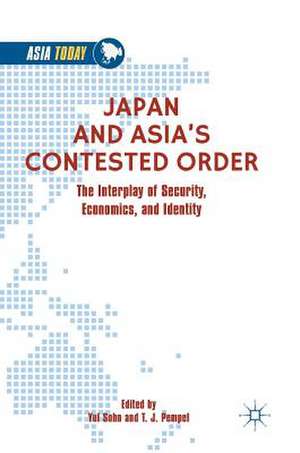Japan and Asia’s Contested Order: The Interplay of Security, Economics, and Identity: Asia Today
Editat de Yul Sohn, T. J. Pempelen Limba Engleză Hardback – 31 aug 2018
| Toate formatele și edițiile | Preț | Express |
|---|---|---|
| Paperback (1) | 781.15 lei 6-8 săpt. | |
| Springer Nature Singapore – 9 feb 2019 | 781.15 lei 6-8 săpt. | |
| Hardback (1) | 786.36 lei 6-8 săpt. | |
| Springer Nature Singapore – 31 aug 2018 | 786.36 lei 6-8 săpt. |
Preț: 786.36 lei
Preț vechi: 958.98 lei
-18% Nou
Puncte Express: 1180
Preț estimativ în valută:
150.48€ • 160.90$ • 125.46£
150.48€ • 160.90$ • 125.46£
Carte tipărită la comandă
Livrare economică 17 aprilie-01 mai
Preluare comenzi: 021 569.72.76
Specificații
ISBN-13: 9789811302558
ISBN-10: 9811302553
Pagini: 266
Ilustrații: XI, 335 p. 13 illus.
Dimensiuni: 148 x 210 x 30 mm
Greutate: 0.57 kg
Ediția:1st ed. 2019
Editura: Springer Nature Singapore
Colecția Palgrave Macmillan
Seria Asia Today
Locul publicării:Singapore, Singapore
ISBN-10: 9811302553
Pagini: 266
Ilustrații: XI, 335 p. 13 illus.
Dimensiuni: 148 x 210 x 30 mm
Greutate: 0.57 kg
Ediția:1st ed. 2019
Editura: Springer Nature Singapore
Colecția Palgrave Macmillan
Seria Asia Today
Locul publicării:Singapore, Singapore
Cuprins
1. Introduction.- 2. Conceptualizing the Economic-Security-Identity Nexus in East Asia’s Regional Order.- 3. Post-Cold War Order in the Asia-Pacific: Equilibrium and its Challenges.- 4. To Dream an Impossible Dream: China’s Visions of Regional Order and the Implications for Japan.- 5. Spying, Subversion and Great Power Identity Conflict between the United States and China.- 6. North Korean Identity as a Challenge to East Asia’s Regional Order.- 7. One Hand Clapping: Japanese Nationalism in the Abe Era.- 8. Confronting History and Security Through Territorial Claims.- 9. Japan's Security Policy and East Asia.- 10. Japan: Working to Shape the Regional Order.- 11. Japan-China Relations and the Changing East Asian Regional Order.- 12. Japan and the Identity Politics of East Asian Maritime Disputes.- 13. Japan and South Korea: The Identity-Security-Economy Nexus in a Turbulent Relationship.- 14. Japan and Northeast Asian Regionalism: Overcoming Political Animosity for Economic Integration.- 15. Conclusion.
Notă biografică
T. J. Pempel, with a Ph.D. from Columbia University, is Jack M. Forcey Professor of Political Science in U.C. Berkeley's Department of Political Science which he joined in July 2001. He served as director of the Institute of East Asian Studies from 2002 until 2006.
Yul Sohn, with a Ph.D. from the University of Chicago in Political Science, is Professor of International Studies in Yonsei University's Graduate School of International Studies. He is also President of the East Asia Institute, a premier foreign policy think-tank in South Korea.
Textul de pe ultima copertă
This book brings together up-to-date research from prominent international scholars in a collaborative exploration of the Japan’s efforts to shape Asia’s rapidly shifting regional order. Pulled between an increasingly inward-looking America whose security support remains critical and a rising and more militarily assertive China with whom Japan retains deep economic interdependence, Japanese leaders are consistently maneuvering to ensure the country’s regional interests. Nuclear and missile threats from North Korea and historically problematic relations with South Korea further complicate Japanese endeavors. So too do the shifting winds of Japanese domestic politics, economics and identity. The authors weave these complex threads together to offer a nuanced portrait of both Japan and the region. Scholars, observers of politics, and policymakers will find this a timely and useful collection.
T. J. Pempel, with a Ph.D. from Columbia University, is JackM. Forcey Professor of Political Science in U.C. Berkeley's Department of Political Science which he joined in July 2001. He served as director of the Institute of East Asian Studies from 2002 until 2006.
Yul Sohn, with a Ph.D. from the University of Chicago in Political Science, is Professor of International Studies in Yonsei University's Graduate School of International Studies. He is also President of the East Asia Institute, a premier foreign policy think-tank in South Korea.
Caracteristici
Explores what the rise of China means for Japan and its image of itself Analyzes the relationship between American and Japanese politics Provides a panoramic view of regional tensions in East Asia today














